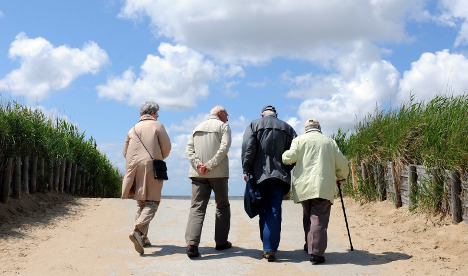German babies born in the southern states of Baden-Württemberg and Bavaria are expected to live longer than those born in more central and northern states, new figures released by the Federal Statistical Office (Destatis) on Thursday showed.
Babies born in Baden-Württemberg were predicted to live the longest at 79 years and six months for boys, and 83 years and 11 months for girls, for the period between 2013 and 2015. The southwestern state also claimed the highest average life expectancy 20 years ago.
Bavaria was a close second at nearly 79 years for boys and 83 years and six months for girls.
Both states were higher than the national average of 78 years and two months for boys and 83 years and one month for girls.
The calculations were based on “how long newborns would live given the current survival conditions,” Destatis explained.
The report compared life expectancy for newborns in recent years to predictions for babies born between 1993 and 1995, shortly after reunification of the formerly divided East and West Germany during the Cold War.
“The living conditions in East and West have equalized,” Destatis statistician Felix zur Nieden told German news agency DPA.
Over the past 20 years, regional differences in the life expectancy of newborn children have decreased significantly: the gap between the states with the highest life expectancy and those with the lowest has fallen by nearly half.
According to the most recent figures, the state with the lowest life expectancy for women was Saarland in the west, at about 82 years. The lowest life expectancy for men was in Saxony-Anhalt in the east at about 76 years.
Between 1993 and 1995, the northeastern state of Mecklenburg-Western Pomerania had the lowest life expectancy, but since then children born there have made huge gains in how long they're predicted to live: 7.7 more years for men and 5.3 more years for women. This means Mecklenburg-Western Pomerania has seen the biggest improvements of any state in that time.
On average across Germany, women are projected to live 3.6 years longer than they were in 1993-1995, and men are calculated to live 5.2 years longer.
“undefined”==typeof window.datawrapper&&(window.datawrapper={“RbhZC”:{}}),window.datawrapper[“RbhZC”].embedDeltas={“100″:583,”200″:527,”300″:499,”400″:499,”500″:471,”600″:471,”700″:471,”800″:471,”900″:471,”1000”:471},window.datawrapper[“RbhZC”].iframe=document.getElementById(“datawrapper-chart-RbhZC”),window.datawrapper[“RbhZC”].iframe.style.height=window.datawrapper[“RbhZC”].embedDeltas[Math.min(1e3,Math.max(100*Math.floor(window.datawrapper[“RbhZC”].iframe.offsetWidth/100),100))]+”px”,window.addEventListener(“message”,function(a){if(“undefined”!=typeof a.data[“datawrapper-height”])for(var b in a.data[“datawrapper-height”])”RbhZC”==b&&(window.datawrapper[“RbhZC”].iframe.style.height=a.data[“datawrapper-height”][b]+”px”)});



 Please whitelist us to continue reading.
Please whitelist us to continue reading.
Member comments